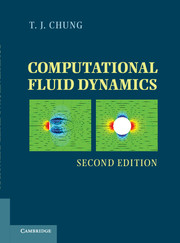Book contents
- Frontmatter
- Contents
- Preface to the First Edition
- Preface to the Revised Second Edition
- Part One Preliminaries
- Part Two Finite Difference Methods
- Part Three Finite Element Methods
- Chapter Eight Introduction to Finite Element Methods
- Chapter Nine Finite Element Interpolation Functions
- Chapter Ten Linear Problems
- Chapter Eleven Nonlinear Problems/Convection-Dominated Flows
- Chapter Twelve Incompressible Viscous Flows via Finite Element Methods
- Chapter Thirteen Compressible Flows via Finite Element Methods
- Chapter Fourteen Miscellaneous Weighted Residual Methods
- Chapter Fifteen Finite Volume Methods via Finite Element Methods
- Chapter Sixteen Relationships Between Finite Differences and Finite Elements and Other Methods
- Part Four Automatic Grid Generation, Adaptive Methods, and Computing Techniques
- Part Five Applications
- Appendixes
- Index
- References
Chapter Eleven - Nonlinear Problems/Convection-Dominated Flows
from Part Three - Finite Element Methods
Published online by Cambridge University Press: 05 June 2012
- Frontmatter
- Contents
- Preface to the First Edition
- Preface to the Revised Second Edition
- Part One Preliminaries
- Part Two Finite Difference Methods
- Part Three Finite Element Methods
- Chapter Eight Introduction to Finite Element Methods
- Chapter Nine Finite Element Interpolation Functions
- Chapter Ten Linear Problems
- Chapter Eleven Nonlinear Problems/Convection-Dominated Flows
- Chapter Twelve Incompressible Viscous Flows via Finite Element Methods
- Chapter Thirteen Compressible Flows via Finite Element Methods
- Chapter Fourteen Miscellaneous Weighted Residual Methods
- Chapter Fifteen Finite Volume Methods via Finite Element Methods
- Chapter Sixteen Relationships Between Finite Differences and Finite Elements and Other Methods
- Part Four Automatic Grid Generation, Adaptive Methods, and Computing Techniques
- Part Five Applications
- Appendixes
- Index
- References
Summary
For fluid dynamics associated with nonlinearity and discontinuity, there have been significant developments in the last two decades both in finite difference methods (FDM) and finite element methods (FEM). Concurrent with upwind schemes in space and Taylor series expansion of variables in time for FDM formulations with various orders of accuracy, numerous achievements have been made in FEM applications since the publication of an earlier text [Chung, 1978]. These new developments include generalized Galerkin methods (GGM), Taylor-Galerkin methods (TGM) [Donea, 1984], and the streamline upwind Petrov-Galerkin (SUPG) methods [Heinrich et al., 1977; Hughes and Brooks, 1982], alternatively referred to as the streamline diffusion method (SDM) [Johnson, 1987], and Galerkin/least squares (GLS) methods [Hughes and his co-workers, 1988–1998]. In the sections that follow, it will be shown that computational strategies such as SUPG or SDM and other similar methods can be grouped under the heading of generalized Petrov-Galerkin (GPG) methods. Recent developments include unstructured adaptive methods [Oden et al., 1986; Löhner, Morgan, and Zienkiewicz, 1985], characteristic Galerkin methods (CGM) [Zienkiewicz and his co-workers, 1994–1998], discontinuous Galerkin methods (DGM) [Oden and his co-workers, 1996–1998], and flowfield-dependent variation (FDV) methods [Chung and his coworkers, 1995–1999], among others. On the other hand, the concepts of FDM and FEM have been utilized in developing finite volume methods in conjunction with unstructured grids [Jameson, Baker, and Weatherill, 1986]. It appears that FDM and FEM continue to co-exist and develop into a mature technology, mutually benefitting from each other.
We begin in this chapter with the general discussion of boundary conditions for the nonlinear momentum equations, followed by Taylor-Galerkin methods (TGM) and generalized Petrov-Galerkin (GPG) methods as applied to Burgers’ equations. Some special topics such as Newton-Raphson methods and artificial viscosity are also discussed in this chapter. Applications to the Navier-Stokes system of equations characterizing incompressible and compressible flows are presented in Chapters 12 and 13, respectively.
Information
- Type
- Chapter
- Information
- Computational Fluid Dynamics , pp. 347 - 406Publisher: Cambridge University PressPrint publication year: 2010
